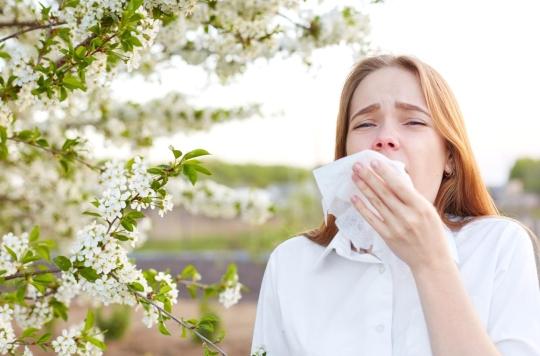Climate change due to natural or human factors would aggravate seasonal allergies, also called “allergic rhinitis”, “pollinosis” or “hay fever”.

- Among the causes of the increase in the frequency of allergies, we also find changes in dietary practices, the proliferation of drugs or changes in the indoor environment (hygiene, materials used, etc.).
- Climate change would have an impact on the pollination period. Because of this variation in climate, the pollen season would start 20 days earlier and be 10 days longer.
- Pollen concentrations are also said to have increased by 21%, which increases the duration of seasonal allergy symptoms.
25 to 30%. This is the proportion of French people suffering from allergies. In France, the frequency of these hypersensitivities to allergens has been increasing for several years. This increase seems to be linked to various environmental factors, such as air pollution. According to a study published in the scientific journal Proceedings of the National Academy of Sciences, climate change could also have an impact on seasonal allergies. Biologists at the University of Utah in the United States have found that it can increase the duration of symptoms of allergic rhinitis.
Climate change induces an extension of the pollination period
To reach this conclusion, the researchers analyzed data from the National Allergy Bureau (NAB) on airborne pollen and mold across the United States and Canada. The information was collected between 1990 and 2018. “We are using a suite of climate models to test the role of climate change and find that it is the main driver of an extension of the pollination period and that it contributes significantly to the increase in pollen concentrations. “ and their allergenic properties, can we read in the works.
Pollen season starts 20 days earlier than in 1990
According to the work, the pollination period now begins 20 days earlier than in 1990 and is also 10 days longer. During the pollen season, pollen concentrations increased by 21%. That means “no more days of itching, sneezing and runny nose”, indicated the biologists in a statement from the university.
“Our results reveal that climate change has already exacerbated pollen seasons over the past three decades, with deleterious effects on respiratory health,” they added. These climate-related pollen trends are likely to further exacerbate impacts on respiratory health over the coming decades.
“Climate change is not something far away. It’s already here, in every spring breath we take. The bigger question is, are we ready to fight it?” said William Anderegg who led the research.
.















